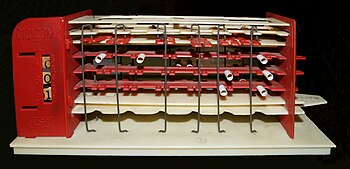This article needs additional citations for verification. (September 2014) |
The Digi-Comp I was a functioning, mechanical digital computer sold in kit form. It was originally manufactured from polystyrene parts by E.S.R., Inc. starting in 1963 and sold as an educational toy for US$4.99 (equivalent to US$50 in 2023).[1]

The Digi-Comp I has been referred to as the first home computer.[2]
A successor, the Digi-Comp II, was not programmable, but in effect a visible calculator. A two-level Masonite platform with guides served as the medium for a supply of marbles that rolled down an inclined plane, moving plastic cams as they fell.[3]
Operation
editThe Digi-Comp I contained three mechanical flip-flops, providing an ability to connect them together in a programmable way using thin vertical wires that were either pushed, or blocked from moving, by a number of cylindrical pegs. The whole arrangement was "clocked" by moving a lever back and forth. Different configurations of these cylinders caused the Digi-Comp to compute different Boolean logic operations. With a three binary digit (3-bit) readout of the state of the flip-flops, it could be programmed to demonstrate binary logic, to perform various operations such as addition and subtraction, and to play some simple logic games such as Nim.[4]
Although promotional materials described it as an "actual working digital computer," the device is more accurately described as a finite-state machine, one of the underpinning concepts used to build computers.
Reproductions
editStarting in 2005, Minds-On Toys has made available the Digi-Comp I version 2.0 as a relatively inexpensive binder's board version of the original Digi-Comp, albeit with a much enhanced instruction manual.[5]
See also
edit- Dr. Nim - game based on the computer
- Geniac
- WDR paper computer
- CARDboard Illustrative Aid to Computation
- Turing Tumble, a 2019 mechanical computer inspired by it
- Robert C. Martin, who credits playing with this toy at the age of 12 as being what made him decide to become a programmer for the rest of his life.[6]
- Little man computer
References
edit- ^ "Electronic Computer Brain". Archived from the original on 2017-12-11.
- ^ Winkless, Nelson (November 1984). "The First Home Computer". Creative Computing: 12.
- ^ "Yahoo friendsofdigicomp". Archived from the original on June 30, 2013. Retrieved 2013-04-17.
- ^ Woodhouse, Trevor. "K'nex Computer". YouTube. Trevor Woodhouse. Archived from the original on 2021-12-21. Retrieved 2015-11-15.
- ^ "Minds-On Toys - Kits". Retrieved 2013-04-17.
- ^ Clean Code - Uncle Bob / Lesson 5, archived from the original on 2021-12-21, retrieved 2021-06-23
External links
edit- The Old Computer Museum - Collection of old analog, digital and mechanical computers
- Friends of Digi-Comp - Discussion of this toy. Images, links, manuals and programming information
- Digi-Comp I v2.0 - Online vendor of working replica kit; historical details
- Digi-Comp I Emulator - Emulator for the original Digi-Comp I written in JavaScript